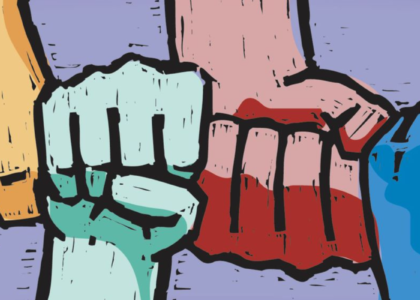“The little space there was for civil society has been steadily eroded”
Amy is joined by journalist Dr. Leta Hong Fincher to discuss her book, Leftover Women: The Resurgence of Gender Inequality in China, as well as recent changes in Chinese gender relations, and the courageous women defying their state in search of a more equitable future.
Our Guest
Dr. Leta Hong Fincher

Dr. Leta Hong Fincher has written for the New York Times, Washington Post, The Guardian, Dissent Magazine, Ms. Magazine, Harper’s Bazaar and others. As a long-time TV and radio journalist based in China, she won the Society of Professional Journalists Sigma Delta Chi Award, the Cowan Award for Humanitarian Reporting and other journalism honors for her reporting. The 10th anniversary edition of Leta’s first book, Leftover Women: The Resurgence of Gender Inequality in China (2023), was named one of the best books of 2023 by China Books Review. Leta’s second book, Betraying Big Brother: The Feminist Awakening in China, was named one of the best books of the year by Vanity Fair, Newsweek, Foreign Policy Interrupted, Bitch Media and Autostraddle; it was also a New York Times “New and Noteworthy” pick. The New York Public Library named Betraying Big Brother one of its “essential reads on feminism” in 2020. The original edition of her book Leftover Women was named one of the top 5 China books of the year by the Asia Society’s ChinaFile and one of the best Asian books of the year by Asia House. It was on the New York Times list of recommended books on China in 2018 and on Book Riot’s list of 21 recommended Chinese history books in 2021.
Leta is the first American to receive a Ph.D. from Tsinghua University’s Department of Sociology in Beijing. She graduated from Harvard University magna cum laude with a bachelor’s degree in East Asian Languages and Civilizations and won a Harvard Foundation award for contribution to race relations. She was awarded a Shaw fellowship and Walter Shorenstein fellowship for her master’s degree in East Asian Studies from Stanford University. She is currently a Research Associate at the Weatherhead East Asian Institute, Columbia University.
The Discussion
Amy Allebest: During my research on global patriarchy last year I read two books on China that blew my mind. One was called Leftover Women: The Resurgence of Gender Inequality in China, and the other was called Betraying Big Brother: The Feminist Awakening in China. Both of these books are by Dr. Leta Hong Fincher. I want to start today’s episode with a quote from the book Betraying Big Brother that represents some of the themes that are in both books:
“According to the Chinese government, women must marry men to preserve social stability, to provide an outlet for men’s violent urges, and perform unpaid labor at home. Women must breed babies to relieve the aging of the population and the shrinking of the workforce. Although, in line with Han Chinese supremacist eugenics, only educated Han Chinese women are supposed to have more babies. Education is only necessary in order for women to play their proper role as mothers so that they can build up a highly skilled workforce for China’s future. Finally, women must care for the elderly so the government does not have to spend money on a comprehensive welfare program, and women must nurture the ‘harmonious family at the heart of the authoritarian state.’”
These statements describe a blatantly patriarchal ideology in the Chinese government, and I’m so excited to discuss these issues with the author of these books, Dr. Leta Hong Fincher. Thanks for being here, Leta.
Leta Hong Fincher: Thank you for having me.
AA: I’d like to introduce you to our listeners, Leta, by reading your professional biography first, and then I’ll ask you to introduce yourself a little more personally afterward.
Dr. Leta Hong Fincher is a journalist and scholar who has written for The New York Times, The Washington Post, The Guardian, Dissent Magazine, Ms. Magazine, the BBC, CNN, and others. She won the Society of Professional Journalists Sigma Delta Chi Award for her China reporting. Fluent in Mandarin, Leta is the first American to receive a PhD from Tsinghua University’s Department of Sociology in Beijing, and she is currently a research associate at the Weatherhead East Asian Institute at Columbia University. She has a master’s degree from Stanford and a bachelor’s degree with high honors from Harvard. Her book Betraying Big Brother: The Feminist Awakening in China was named one of the best books of 2018 by multiple publications, and the New York Public Library named Betraying Big Brother one of its Essential Reads on Feminism in 2020. Leta’s first book, Leftover Women: The Resurgence of Gender Inequality in China, was named one of the top five China books of 2014 by the Asia Society’s China File, one of the best books of 2014 by Foreign Policy Interrupted, and one of the best Asian books of 2014 by Asia House. In 2018, it was named on The New York Times list of recommended books on China and Time Out Beijing‘s list of best books on women in modern China.
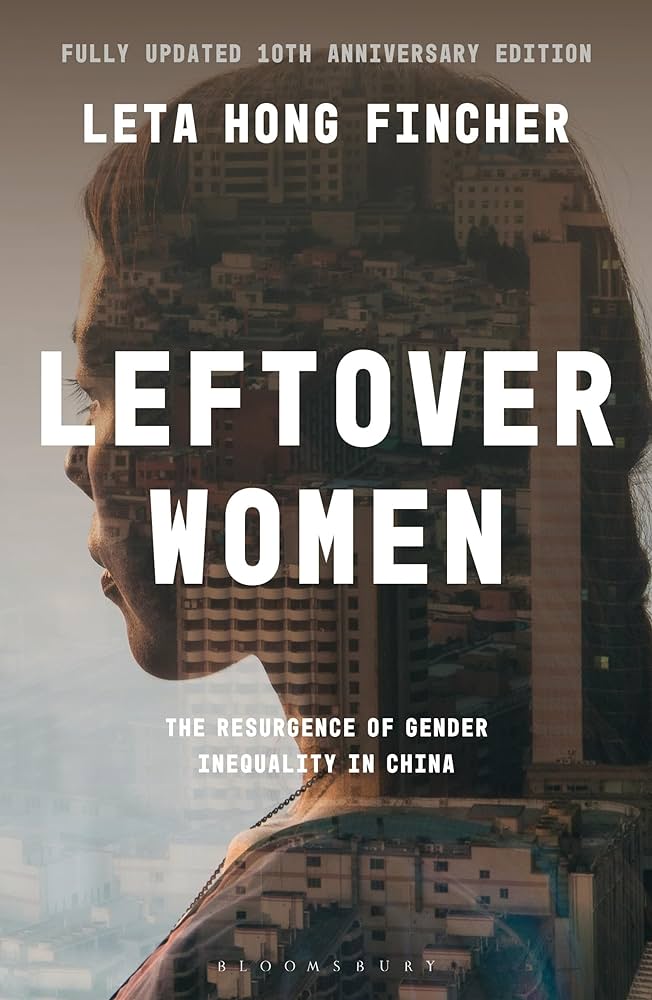
The 10th anniversary edition of Leftover Women just came out, and this is the book that we’ll be discussing today. I’m so excited to talk about it with you, Leta. But before we dive into that conversation, I’d love it if you could tell us a little bit about your history and what led you to do the work that you do.
LHF: Well, it’s a pleasure to be here. Thank you. I have lived in a lot of different places around the world. I was born in Hong Kong, and my mother is a Chinese immigrant who actually grew up in Vietnam. I grew up primarily in Australia, but I traveled to China throughout my childhood. After I graduated with a master’s degree from Stanford University, I became a journalist and was a longtime TV and radio journalist based in China, doing extensive traveling throughout China. And I did a lot of reporting on women’s stories in China. I had already considered myself to be a feminist ever since high school, actually. After I had a couple of children in the US, my husband and I, my husband is also a journalist, we decided we’d like to go back to China again as journalists. And I was working for Voice of America, and Voice of America in 2009 sponsored me for a second tour as Beijing correspondent. I didn’t get the visa immediately, but my husband got his journalist visa so we decided to move back on his visa first with our two little children and enroll them in preschool. I wound up waiting for nine months for my journalist visa to come through because it’s illegal to do any kind of reporting in China if you don’t have permission from the Chinese foreign ministry. So I became quite anxious about not having any legal work status. And my mother, who’s a longtime academic, suggested that I apply to do a PhD program in Beijing. So I did apply and I wound up getting a scholarship from Tsinghua University. And I was the first American to get a PhD in sociology from Tsinghua.
It was at Tsinghua University that I started doing research on gender and the purchasing of real estate. I was looking into this tight link between marriage and home buying, and I did extensive interviews and research. And it was during the interviews with some of these young women, who were very bright and often very well educated in their twenties, who started telling me that they felt like they had to make all these compromises when they got married because they were “leftover women”, or 剩女 (shèngnǚ), as they’re called in Mandarin. So then I started looking more into this term, and I realized that this was not just some free-floating term. I concluded that this must be a deliberate propaganda campaign from the Chinese government targeting educated single women in their mid twenties or older, and stigmatizing them and scaring them into believing that they have to hurry up and get married, otherwise no man will ever want them and they’ll never be able to get married again.
And so, I thoroughly researched the misogyny in this propaganda. And I also found a curious link with a Chinese state council announcement at the beginning of 2007 saying that China had an urgent problem of “low population quality” and that the country needed to “upgrade population quality” in order for the country to be able to maintain proper economic development and maintain its competitive edge in the future. And that there were all these population challenges that posed a real threat to social stability, as they call it in China. So basically I put all of these different things together, and at the time that I was doing all of these interviews, there wasn’t a lot of data about population engineering and pressures on the marriage rate. So I put forward a lot of arguments at the time in the original edition of the book, which was published in 2014.
But I just came out with a 10th anniversary, fully revised edition of Leftover Women. A lot of what I argued a decade ago without other evidence has actually been borne out, and a lot of these arguments have been proven to be true. One of the most important developments over the past decade was that the cohort of young women that I was interviewing starting in 2011, the educated women in their twenties or early thirties, are increasingly rejecting marriage and childbearing. At the time that I did all of my interviews, I did in fact interview some women who were even back then saying that they never want to get married or have babies, or maybe they want to have a baby but they never want to get married. That’s the main gist of it.
But starting in 2011, that was still a fringe kind of view. Although I did interview quite a few women who expressed that to me, the majority of the women that I was interviewing at the time were not going to renounce marriage. They felt like they didn’t have any alternative other than getting married. And so they were frequently in extremely unhappy relationships, but they still wanted to get married anyway. They still often wanted to marry the very person that they were complaining about anonymously to me, because I promised anonymity to everybody. But this is a really seismic shift in China, actually, that has led to not just the plummeting of marriage rates, falling birth rates, but in fact, starting in 2022, the population of China shrank for the first time in many decades. The last time it shrank was during a period of mass famine at the beginning of the 1960s. So what we’re seeing today is really this crisis that the Chinese government was concerned about back when I was doing my research, but at the time, the data still showed that most women were getting married. But today the mainstream opinion of young people, especially young women, has changed dramatically.
AA: It seems like the government’s efforts have actually backfired between the time that you wrote the first edition and the second edition, right?
LHF: Yeah, absolutely. So the propaganda that was very misogynistic, stigmatizing single educated women, was actually quite effective in the early years. It was unveiled in 2007 and I was doing my interviews from primarily 2011 to 2013. And at that time, most of the women I interviewed were still really concerned about not being able to get married and being rejected by men. And so it felt like they had no choice but to accept all these compromises. But I mean, even then there was the beginning of a feminist movement that I wound up writing a separate book about called Betraying Big Brother. I wrote about it a little bit in the original edition of Leftover Women, but of course, the feminist movement became a much more potent political force. And the government started a really brutal anti-feminist crackdown starting in 2015, and it’s still going on today.
So, yes, but certainly pro-marriage and increasingly in the last few years it’s been pro-natalist propaganda as well. The government used to have what was called a one-child policy, which was kind of an oversimplification, but it was this really draconian population planning policy that resulted in all sorts of abuses of human rights, including mass forced sterilizations, many cases of forced abortion, forced insertion of IUDs that went on for decades. But then at the end of 2015, the government eased that policy and introduced what it called a two-child policy to boost birth rates. But effectively that’s been a failure. The government introduced a new three-child policy in 2021, which has also failed to boost birth rates. So we’re seeing even more of what I would call ominous language, and some policies that are trying to boost birth rates even further among that segment of the population in particular that’s educated and majority Han Chinese.
AA: Maybe we could quickly back up just to frame this issue. I wanted to start, for listeners who aren’t very familiar with Chinese history, Mao Zedong in the mid-20th century was famous for a statement where he said “women hold up half the sky,” right? And so my association with the communist party in China was that it was gender equitable. Prior to reading your books I had a different expectation of what the gender dynamics would be, so that’s why these books of yours were so eye-opening to me. I wonder if you can acquaint us really quickly with the current general secretary of the Communist Party, Xi Jinping. Do you pronounce it Xi Jinping?
LHF: Xi Jinping.
AA: Yes, thank you. I won’t pronounce it very well. But we see him in the news, and my impression of him is that he’s extremely patriarchal, that it’s very much a hierarchy in the government and it’s all about power. But the way you described his ideology, and it’s very blatant actually, was really eye-opening. Could you talk about him and that patriarchal structure that pervades society in China right now?
LHF: Sure. Well, I will say a little bit about the history of feminism in China, because you’re absolutely right. Mao Zedong, one of his most famous sayings was “women hold up half the sky,” and gender equality was a really important value for the communists, even before they won the revolution and took over governing the country in 1949, establishing the People’s Republic of China. But in the early communist era, in the 1950s all the way until the end of the 1970s, the government, or the communist party that was ruling, assigned women jobs. And this was communist practice around the world, actually, basically full employment for women up until their mid-fifties. And that would include assigning women very senior managerial positions. So China had the highest female labor force participation in the world. And it has a very rich history of feminism, in fact, going all the way back to the turn of the 20th century that I write about in both of my books, but I get into it in the new edition of Leftover Women as well.
…the feminist movement became a much more potent political force. And the government started a really brutal anti-feminist crackdown…
Alongside these market reforms that were introduced at the very end of the 1970s, we saw the dismantling of the planned economy. And it was then that women bore the brunt of the transition from a planned economy to a more market based economy, and women were the first to be laid off in the restructuring of that state-owned economy. And that’s a big part of it. So there was this strong element of patriarchy certainly in Chinese history over millennia. But then what’s so interesting is that through these, and it’s not just the Communist Revolution, there were others overthrowing the imperial dynasties at the end of the 20th century. In these revolutions, feminism played a really important role. What is really fascinating today is that that feminist legacy is still alive among normal people, but not for the government, especially under Xi Jinping, who’s the current ruler. And he’s been ruling China ever since the end of 2012 and he’s become much more of a dictator who has built a personality cult that is kind of similar to the original personality cult of the communist Chinese founder Mao Zedong back in 1949. But the personality cult today surrounding Xi Jinping is also very heavily patriarchal, and that was not part of early communist propaganda at all. It was the complete opposite, in fact, if you compare the kinds of propaganda today versus many decades ago.
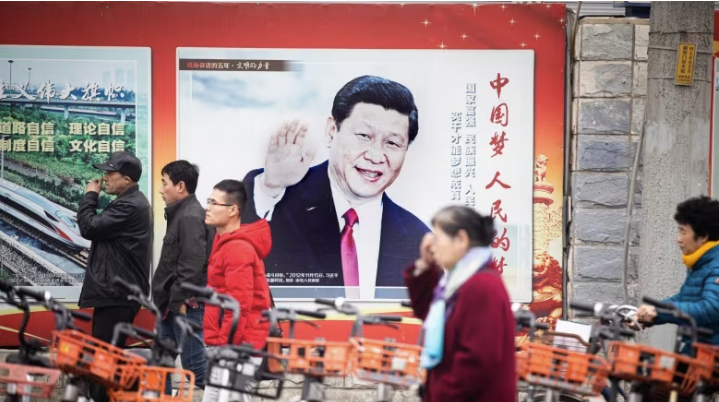
So there was this increase in gender inequality in China alongside market reforms in the ‘80s and ‘90s, but especially in the 2000s. And that also went along with historic levels of educational achievement among women. Today, women in China are better educated than ever before in Chinese history, but rather than seeing that as something to be celebrated, the Chinese government sees it as a threat. It sees it as a threat to men in many different ways. It can be seen as a threat to men’s employment prospects. There is a new, very serious sex ratio imbalance that is caused in large part by these really coercive population control policies that the government introduced for many decades. Today there are about 30 million more men than women, so there’s actually an acute shortage of women of marriage and child-rearing age vis-à-vis men. So the people who are having a lot of trouble finding marriage partners are actually men, which is one of the deep ironies of a propaganda campaign labeling women as “leftover women” when in fact the surplus gender is actually men.
But getting back to Xi Jinping and patriarchy, after doing a lot of research on women and paying attention to the propaganda under Xi Jinping in particular, he actually came to power by representing himself as a new strongman who would stand up for the country of China in a very patriarchal, hyper-masculine way. In fact, in his first major speech as general secretary of the Communist Party, he described himself as being unlike Gorbachev in the Soviet Union. He said Gorbachev was not man enough to stand up to the dissolution of the Communist Party in the Soviet Union, so that’s why you had the collapse of communism in the Soviet Union. But Xi Jinping was basically saying, I’m man enough to prevent the same thing from happening in China. I’m not going to allow these hostile foreign forces, as they’re described quite often in the propaganda in China, to undermine the Communist Party in China. So, looking at a wide range of different things, including widespread intimate partner violence that is completely unchecked in China, and it’s intensified under Xi Jinping, I make the argument that the Communist Party today relies on the subjugation of women to maintain its control over the entire population. And that patriarchal authoritarianism is really key to maintaining Communist Party power.
AA: That really came through in your book. I did read both editions of Leftover Women, and it was quite stunning to me how unapologetic and masculine his language is. I think he either calls himself or is called Xi Dada, like the father of the family state under heaven, right? Like he’s the patriarchal leader of the state. That was pretty stunning to me. One other thing that I wanted to ask you now, since we’re talking about government control, there’s an agency called the Women’s Federation. And as I was reading, I guess because of the name of it, I thought it was going to be this progressive feminist organization. And then it was really interesting to see their role in perpetuating some of these things that you’re talking about. Could you tell us about the Women’s Federation?
LHF: Yes. The All China Women’s Federation is the Chinese state agency that was supposed to, or it says its mandate is to protect and promote women’s rights and interests, but it really doesn’t do that. I mean, I guess in some ways it does, but it’s primarily an organ of the Communist Party and it primarily serves to control women. When I was looking at the propaganda surrounding “leftover women”, stigmatizing and insulting single, educated women, I was quite surprised to find that it was actually very strongly pushed by the All China Women’s Federation. And I found on their website all of these blatantly misogynistic, really shockingly misogynistic articles about single women and saying that they really had to hurry up and lower their standards when they get married. And I describe a lot of that propaganda in my book Leftover Women.
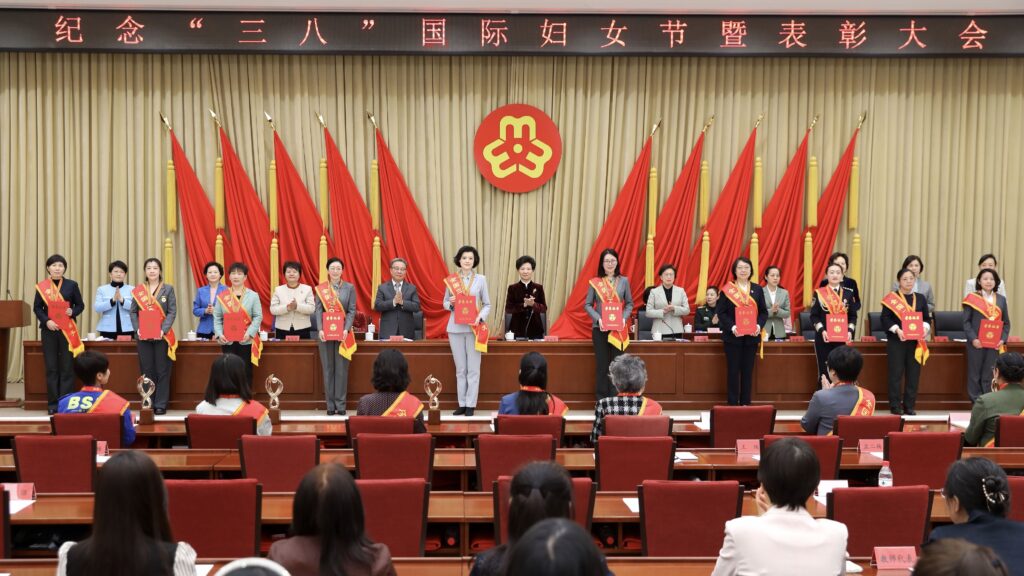
But also, if you look at the history of the All China Women’s Federation, you can see that it was never really that feminist. I think if you go all the way back to the 1920s, things were really different, and that was a fascinating period. That was when the Communist Party was founded in China and there were these communist revolutionaries who were trying to take over the country. And they were trying to recruit women to the revolution, so they espoused all of these slogans about gender equality and feminism. But once the communists won the revolution and took power in 1949, it really changed. I mean, the change happened even before that, actually, but especially after 1949 the All China Women’s Federation then was not really protecting women’s rights. It was doing things like, well, with the so-called one-child policy, it was responsible for ensuring that any so-called “excess births” would be eliminated by forced abortions or even infanticide, female infanticide in particular. And so all of those coercive things that are quite horrifying that were done to women throughout the worst period of enforcement of the one-child policy, those were implemented by the All China Women’s Federation.
AA: Yeah, that was so interesting to read about but really sad. I do have to say, too, listeners really should read all of these books. They were so interesting and so readable. And some of that propaganda made me laugh out loud in horror, but it was funny. Like parents wringing their hands about women not having babies, and skeletons, just the fear tactics were almost comical. But like you say, because they have this problem of a lot of leftover men, or they’re called bare branches, is how it’s translated in Chinese, so they’re trying to get young women. There was even a specific propaganda campaign saying that women prefer men who are ten to fifteen years older than them, when obviously that’s completely made up. It’s just trying to get women to marry men who might be the leftover men. So, that was crazy to me.
But I thought maybe we’d pivot now to one of the other big themes in both editions of the book, which was the real estate market. You say that Chinese women have been “shut out of arguably the biggest accumulation of residential real-estate wealth in history.” How did that happen?
LHF: Well, I mean, it didn’t happen overnight. Enormous gender inequality and wealth that was produced by China’s privatization of housing. Because during the communist era, basically private property was abolished, so housing was assigned by the state and it was worth practically nothing. You really didn’t have to pay for your housing. Housing was basically free. Alongside the market reforms that gathered steam, especially in the 1990s and afterwards, there was this huge initiative to privatize housing and to create a new real estate market rather than just having housing be free and to commodify land and property. And in that process, there were a lot of people who were able to capitalize on a transition from planned to private housing and make a lot of money through buying up housing. And on a very ordinary level, which is what I was looking at, very ordinary young people in China who are expected to buy a home when they get married, I found that first of all, most properties were owned by men. And even though that has changed a little bit over the last decade, it’s still the case that the majority of homes are owned solely by men.
But I found quite alarming patterns of behavior such as young women who made quite a lot of money on their own through their careers that would hand over their life savings to their boyfriend before they even got married, to finance the purchase of a home that was supposed to be the marital home but was only registered in the man’s name. And that was something that was very, very common. Over time as I did more interviews, I began asking more detailed questions about this, and it was an extremely common form of behavior. And part of the reason that that was happening, even when in many cases the women really wanted their own property in their own names, or at least they wanted it jointly owned, which is legal in China. In many cases these women were still pressured by their future in-laws, the parents of their boyfriend, who sometimes would call in tears and say, you know, that happened with some of the cases where the future mother in-law called the future daughter in-law saying that it’s very important that this marital home is registered in her son’s name. And so the young woman would give up her attempt to try to add her name to the property deed.
In many cases, it had to do with gender discrimination from the woman’s own parents, where her parents believed that because she was female, they didn’t need to help her purchase a home. So then she was completely left on her own and they wouldn’t help her. Sometimes these parents only had one daughter and they chose to help their nephew buy a home over their own daughter. And I actually found quite a few examples of that. And on the surface it seems really shocking, but the problem is that housing in China is severely unaffordable, especially when you consider the average income of a Chinese person. It’s much more unaffordable than even the most expensive cities for real estate in America, like San Francisco or New York. When you look at the average income of a Chinese consumer and you look at how expensive it is, it’s severely unaffordable. So basically young people cannot afford to buy homes. And this is what really puts the squeeze on women, because then they become victims of all of these powerful historical forces of sexism within the extended family. And it’s really, really difficult for young women in their twenties or even early thirties, in many cases, to argue that their names should be on the deed of the marital home.
…her parents believed that because she was female, they didn’t need to help her…
AA: One of the most memorable parts of that section for me was you interviewing a young woman and saying, “Does this feel fair to you?” And she was like, “What do you mean? I’m a girl. Of course it’s fair.” And you’re like, “Well, they’re helping your cousin who’s a boy and not you. That’s fair?” “Yep. That’s fair.” And that really resonated with me because of the environment I come from, which is a very overtly patriarchal religious background, and that’s what I’ve seen in my life too. In my lived experiences, everybody absorbs the messaging. Everyone does. It’s a rare case that people can really see something that they haven’t seen modeled for them or that they can see outside the culture in which they’re raised. And so if girls and women have that expectation of themselves, then it’s really, really hard to change the culture. But you also mentioned that not owning a home, I mean, there’s a host of problems that happen if your name isn’t on the deed. But you say that that makes women more vulnerable to abuse. You mentioned a few minutes ago that domestic abuse and gender based violence are a problem in China. Can you talk about that a little bit?
LHF: Yes. Unfortunately, this is one of the areas where the situation has really deteriorated over the last decade. There has long been widespread domestic violence or intimate partner violence in China, which is common around the world. It’s certainly not unique for China.
AA: For sure.
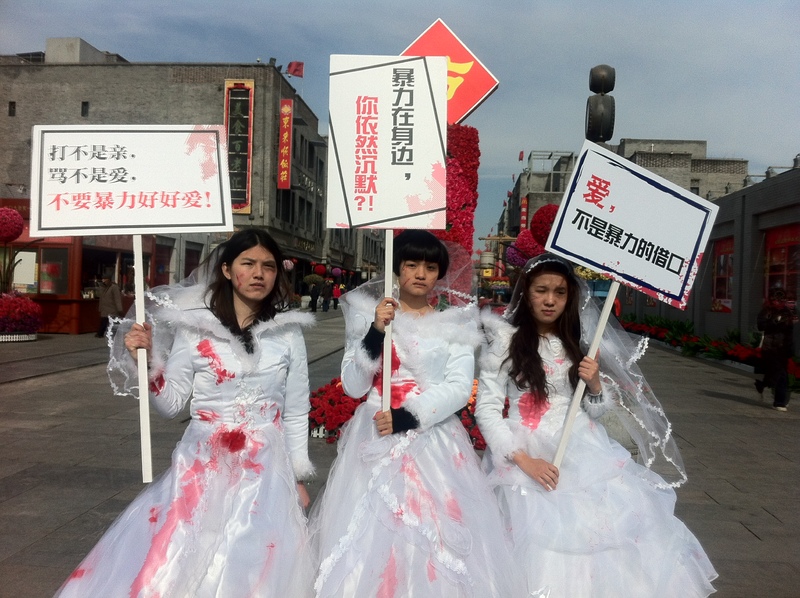
LHF: But the Chinese government actually passed an anti-domestic violence law that was enacted in 2016. But not only has the law not been enforced at all, it’s virtually impossible for victims of violence in their marriage, who are primarily women, to get a restraining order. Very troublingly, just in the last few years, the government has made it far more difficult to get a divorce. I go into this quite a bit in the new edition of Leftover Women, the government introduced something called a divorce cooling off period in 2021 that says that you have to wait a certain period of time before you’re allowed to even go forward with a divorce request. That sounds kind of innocuous, but there’s been really large scale, quantifiable evidence in the last few years that divorce courts are simply not granting divorces to women at all. And it doesn’t matter how badly abused they have been, the judges simply do not care about that at all. And so the anti-domestic violence law is not being enforced. But not only that, it has become even more difficult for women to get a divorce in the first place. In fact, the problem of violence in marriage is even more serious today than it was a decade ago.
In the original edition of my book Leftover Women, I described this as a problem, that when women do not own property they are more vulnerable economically because they don’t have anywhere to live. Your biggest asset in China as an ordinary person is going to be real estate or housing because there are very few other places for you to put your money. But unfortunately, today the problem is even worse than just losing all of your property wealth. If you get a divorce as a woman, it’s really difficult to even get out of that violent marriage in the first place. So even if your name is on the property deed as a woman, if you have an abusive partner and he’s not willing to grant you a divorce, you’re completely stuck. There’s nothing you can do about it, basically, unless you give up your home. And in many cases you have to give up custody of your children too, which is just heartbreaking. But that’s the reality for women today. But I want to add a little bit of a note of hope here. Today, that is part of why so many young women don’t want to get married, is because they see marriage as a trap. So they are actually pushing back against a lot of these very deep-seated cultural norms and also government policies and propaganda.
AA: Well, speaking of that, that brings us to another topic that I wanted to dive into a little more deeply. You mentioned a feminist movement that you cover in your book Betraying Big Brother, and I wonder if we can talk about that for the remainder of the episode and talk about the feminist awakening in China. So, when did it happen? Introduce us to the Feminist Five and the issues at play.
LHF: Sure. Well, as I said, China actually has a rich history of feminism, especially over the 20th century and into the 21st century. But the feminist history has been completely erased by the Communist Party. Even its own history within the Communist Party, its own history of feminism has been erased today. You did not see grassroots feminist activism after the founding of the People’s Republic, because the state control was too strong. But then starting in 2011, and especially in 2012, there were isolated acts of feminist direct action or what they called “performance art” on the streets, drawing attention to things like the epidemic of domestic violence or sexual harassment. But these feminist activists at the time were not, first of all, there weren’t that many of them so the government didn’t pay a lot of attention to them. And they did a lot. There were all of these examples of direct actions that were organized. For example, in 2012, one of the things that feminists did was something called Occupy Men’s Room to highlight the disparity in public toilets for men versus women, which the feminist activists said, well, this is a way that was politically innocuous for us to raise the problem of gender inequality.
But they were able to do things like that without any trouble until 2015. On the eve of International Women’s Day, there were a bunch of feminists in different provinces across China that were planning to celebrate International Women’s Day by handing out stickers about sexual harassment on subways and buses. But just before March 8th, which is International Women’s Day, the police did a huge roundup of feminist activists, sweeping in many different cities and arrested these feminists who were planning to take part in the Women’s Day activities. And then they focused on five young women, brought all of them to Beijing and put them in detention. And those are the five women that I highlight. There are stories in my book Betraying Big Brother, and they became known as the Feminist Five, or China’s Feminist Five. There was a lot of news coverage of them internationally, in fact, and quite a few leaders and rights groups were calling for the government to release these five women because all they had been doing was planning to hand out stickers about sexual harassment. But they were, I mean, I don’t outright describe it as torture in my book, but they were severely mistreated in various ways that are really shocking and they were interrogated constantly. The first thing the security agents did when they arrested these women was confiscate their glasses. And for anybody who had trouble seeing, especially one of them who was severely visually impaired, that was incredibly disorienting. So I tell their stories of their experiences in detention.
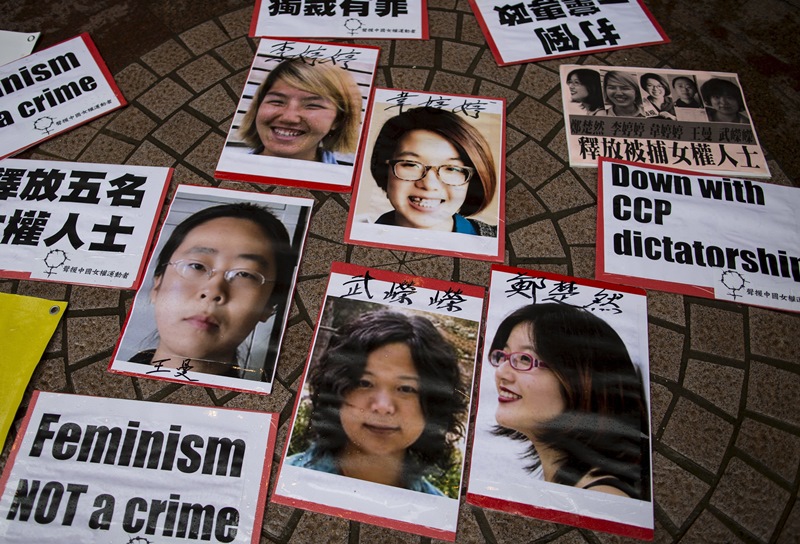
But the thing is, that really marked, ironically, the beginning of a powerful feminist movement in China. A lot has happened since then with regard to feminism. So the government’s crackdown, or decision to jail these five feminists in 2015 also backfired because it unleashed a more powerful, widespread feminist movement. And I don’t think it’s a coincidence that in the years since then, feminist ideas have become a lot more mainstream too. So that today, even though there’s a brutal crackdown on feminist political activism, and some of the feminists today are still getting jailed and severely harassed, in the mainstream you can see more and more young women, especially those who’ve gone to college but not even just confined to them, there’s just more of an awareness among young women in China that they need to stand up for their rights. They need to fight for their rights. But this is, I hasten to add, primarily on an individual lifestyle level that takes the form of resisting pressure to get married or resisting pressure to have babies. But that actually can become quite a powerful form of political resistance itself when you look at how many young women are choosing that. Collectively that creates a lot of pressure on the Chinese government and it’s definitely been a key factor in massively falling marriage and birth rates in the country.
AA: It makes me think of the phrase “voting with your feet”, and I just thought of voting with your womb, like you’re voting with your uterus. So they’ll see that and that will put pressure on them. One thing I was going to ask you about too, one of the most striking things for me in this book was the despair and discouragement when you have an environment that so severely curtails freedom of speech and communication. And I was thinking about how social movements really rely on people being able to communicate with each other in order to organize. Can you talk about maybe then and now, how do feminists communicate with each other when, in my understanding, speech and communication especially on social media are pretty heavily surveilled?
LHF: Yes. Well, this has been a very depressing development in recent years. The little space there was for civil society has been steadily eroded, if not entirely crushed under Xi Jinping. In the early years with these new grassroots feminist movements starting in 2011 or 2012, the feminist activity back then was more on the streets, actually. But then that was no longer a possibility because of political repression, so then it moved more predominantly online. Today, feminist discourse on social media is very, very heavily censored and surveilled. That means that ordinary people posting can sometimes get into trouble with the authorities just for what they’re saying. But it’s really extraordinary how much of a room there still is to express feminist opinions online if you’re not organizing some kind of political protest. It shows you just how popular these ideas are, but there’s still a lot of targeted persecution of individual feminist activists.
As an example of the repression, in 2018 there was a #MeToo movement that really took off across a lot of Chinese university campuses. But then the #MeToo hashtag or #MeToo related discussions were very heavily censored in 2018. And these academics did a study showing that #MeToo was one of the most censored hashtags in China in 2018. In fact, just last year, one of the #MeToo leaders, a woman named Sophia Huang Xueqin, was detained and held for two years. And last year she had to stand trial on charges of subversion. And that just shows you how incredibly dangerous it is to take a stand, even when it’s not overtly political. You can get into trouble if you’re associated with a political form of feminism. So it is much more dangerous today.
Feminist books and writing are heavily censored. There are books written by a Japanese feminist sociologist called Chizuko Ueno, and her books are huge bestsellers in China because she’s not writing about China. She’s writing about Japan. And so there are these gray areas where you can see that there is still discussion, public discussion even, of feminist topics. Another example is, I mean it’s pretty white, but the fact that the movie Barbie actually was screened in China. It kind of flew under the radar of Chinese censors and it was quite popular. But of course it’s a comedy, it’s about Barbie the doll, but it does show you that there’s this enduring popularity that does evade the censors’ control to some extent.
You can get into trouble if you’re associated with a political form of feminism. So it is much more dangerous today.
AA: Yeah, that’s really interesting. One of my other questions was going to be asking about this dynamic that exists in a lot of places where feminism is seen as a hostile foreign influence. That it’s seen as a Western thing, it’s a white women thing. And so it’s hard because speaking with other scholars and feminists across the world, they’ll say it is tricky because each country obviously has its own indigenous, native feminist movement, its own feminist history, but if they are seen in any way as in solidarity with white Western feminism, then it’s kind of vilified. So that’s really interesting to me to hear about a Japanese writer being able to have influence, perhaps because it’s not seen as Western, right? It’s an Asian writer. Is that why she’s able to have a voice there?
LHF: Well, it’s of course impossible to tell exactly why a certain author is not censored. But what I can say is that Japan is very similar in culture to China, but Japan’s a democracy. But it is East Asian, it has a long history of Confucianism, which is very traditional, very heavily patriarchal. And so Japan has a lot of similar problems with sexism in its culture. And so that’s what this Japanese author writes about. But getting to this idea of feminism as being a tool or a force used by hostile foreign countries, or that there’s a thing called Western feminism, but actually that’s really just an excuse for the Chinese government to crack down on any kind of feminist activism. Because there is a very rich feminist movement in South Korea as well that is really powerful, but a lot of that language is also heavily censored in China.
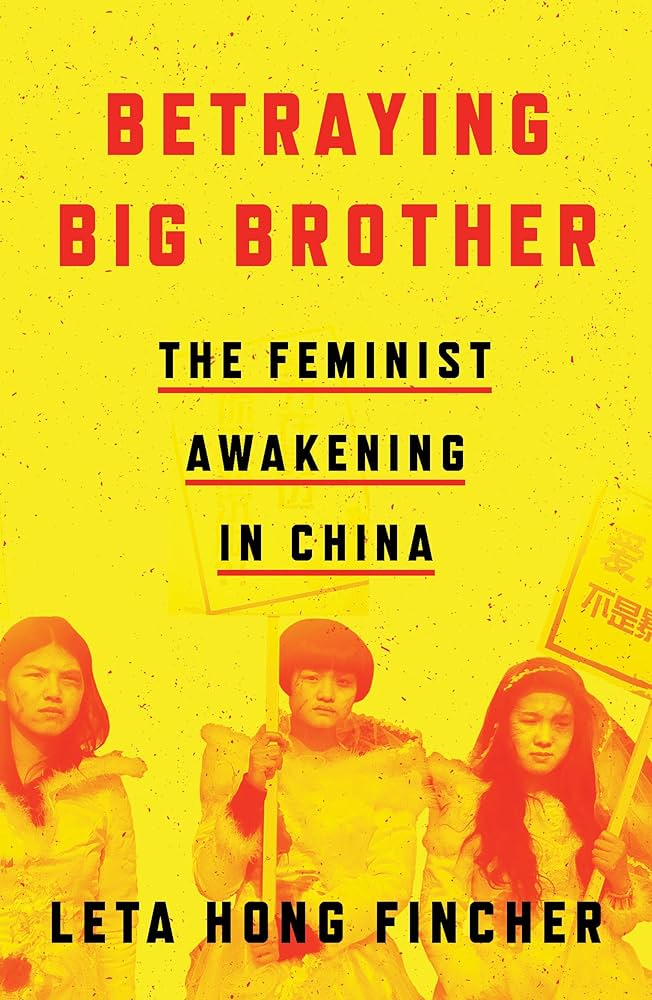
And you don’t have white people indigenous to China, so what you do have is a Han Chinese majority. And this is something that I get into in the new edition of Leftover Women. So it’s ethno-nationalism. They don’t really talk about “white”, but this gets into a very complicated area. In China, the ethnic majority is Han Chinese. So if you are a woman, especially if you’ve gone to college and you’re Han Chinese, then the government wants you to have babies. But if you’re an ethnic minority there, like a Uyghur or a Kazakh woman, then the government is actively trying to prevent you from having more babies. And in fact, we see really disturbing, dramatic decreases in the birth rate in Xinjiang, which is where most Uyghur Muslims or ethnic minority Uyghur or Kazakh women live. And that coincides with the mass detention of Uyghur people. But in fact, the government was carrying out a mass campaign of forced sterilization of Uyghur women at the same time as promoting more births among the ethnic majority Han Chinese population. But this language in the propaganda of describing feminism as a tool used by hostile foreign forces to interfere in China’s affairs is widely used as an excuse to jail troublemakers in China.
AA: Well, it gives me all the more respect for the courage and resilience of people who are fighting back. Because it does sound like it is really an uphill battle and there’s a lot to lose. It’s a really challenging situation. I came away from both books, again, so educated. I learned so much that I had no idea about. And then just so much respect, like I said, for people who are doing such important work to change the culture. And that includes you. It’s such incredibly important work that you’re doing. And it seems like, I think you said in the second edition of Leftover Women that it has been mildly censored, but it is available in China. Is that right?
LHF: Yes.
AA: That’s amazing!
LHF: Well, it’s not widely available anymore, but there was a Mainland Chinese edition of Leftover Women that came out in 2016. And at the time, I mean, yes, the language was mildly censored, but most of the content actually was not censored. And it was very well translated and it was quite popular at the time. But today it’s much more difficult to find the Chinese version of my book, but it is still out there. There are some people who have shown me pictures. I’m not going to tell you where, but it isn’t completely banned and taken off all of the bookshelves.
AA: That’s great news. Well, again, I can’t recommend it highly enough. Listeners, again, it’s Dr. Leta Hong Fincher and her book Leftover Women: The Resurgence of Gender Inequality in China. The new edition is just out. And also Betraying Big Brother: The Feminist Awakening in China. Thank you again so much, Leta, for being here today.
LHF: Thank you so much for having me, Amy!
Young women in China need to stand up for their rights.

They need to fight for their rights.
Listen to the Episode
&
Share your Comments with us below!





